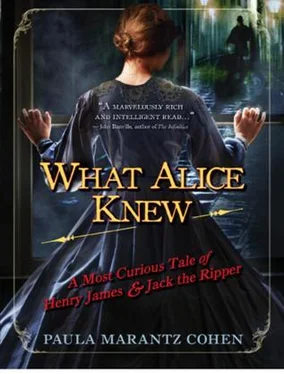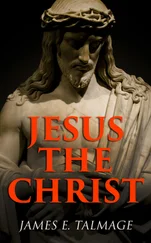“Where’s the child?” asked William, though as soon as he asked, he wished that he hadn’t.
The woman pointed to one of the doorways, where a boy stood watching. He looked about ten, though he was undernourished, and William imagined he was probably a year or so older. His face was drawn and expressionless, but his eyes looked perceptive, and for a moment William thought he saw something like relief in them. Was it a relief to have his mother, perennially sad and useless, finally gone out of this world?
Looking at the boy made William’s throat constrict. The thought of his own beloved and pampered child dead, and of this child, so neglected and impoverished, alive—what did it mean? Whose will was behind it? On what basis could William cling to the spiritual belief of which he had spoken to Abberline? Wanting to leave the scene, he nonetheless found himself walking over to where the boy was standing. “It’s your mother there, I hear,” he said gently, feeling it best to be direct.
The boy looked at him a moment before speaking. “She wanted to do it, and she done it,” he finally said.
“I’m sure she’s in heaven and at peace,” said William.
“I dunno ’bout that,” said the boy. “But she won’ be crying no more. That’s somethin’.”
“And what about you? What will you do with her gone?”
“Same as I done with ’er ’ere.” The boy shrugged.
“Did you live with her?”
“Naw, she coulden have me. Not much room in that basement she lived in, and it made ’er sadder to see me, so’s I stayed with the ol’ lady.” He pointed to the top of the building in whose doorway he was standing. “She can’t walk, so’s I bring ’er things, whatever I can get ’er for dinner, and she lets me sleep on ’er floor.”
“And how do you get money to eat?”
The boy shrugged again. “I dunno. I ha’ my ways. And I don’ eat much. I once had a job with one of them greengrocers, but he went out of business. The ol’ lady says I’m smart enough to fin’ somethin’ respectable if I grows a bit. They don’ like ’em as small as me for mos’ things.”
“I’m sure you’ll grow to a good size,” said William, wondering how the boy would ever grow if he didn’t eat.
“Can I ask you somethin’, sir?” said the boy, obviously feeling that he had met that rare creature, a respectable person who listened to him when he spoke, and that he ought to take advantage of it. “What’s for me to do in the way of buryin’ ’er? That’s been on m’ mind since they found ’er. She diden care for me, but it wasen her fault. She were still my mother. I want she be buried proper and not in one of them graves where they put all the bodies in a heap together.”
William looked at the boy. He wished he could be rid of him and be alone, back in his study in Cambridge, Massachusetts, where he could lose himself in his books or, as he sometimes did, put his head on his desk and weep. His Alice was an exceptional woman who knew when to console him and when it was best to leave him alone. But here he was in the middle of London, and it wasn’t the loss of Hermie or his own father and mother or the burden of his own existence that he had to deal with, but this poor soul with more misery than anything he had ever suffered. What was the use of all the philosophy he’d read and the thinking he’d done when confronted with so simple a piece of human misery? He drew a breath. “What’s your name, boy?” he asked quietly.
“It’s Archie, sir. They says as it stands for Archibald, after my dad, but I don’ think on him, so I’s as soon go by Archie.”
“Well, Archie, I’d be glad to arrange for the burial.” William tried to take a straightforward tone, so as not to seem to be acting out of some ulterior motive. “I’ll tell the coroner myself that you want a proper funeral for your mother.”
“But I can’t pay nothin’, sir,” said the boy.
“It will be on loan from me,” said William, sensing an awkwardness attached to his offering to pay outright. “You could pay me back and make more by doing some work for my sister. She isn’t well, and it would be a source of special gratification to me if you could assist her with household chores. She lives in another part of town, though, and you may not know how to get there.”
The boy’s eyes grew bright. “There ain’t a place in London I don’ know, sir. I been to the poshest places—jus’ to see what they’re like,” he hurried to explain. “You tell me where’s to go to make a farthin’, and I’ll do it.”
William scribbled Alice’s address on a piece of paper and then paused before handing it over.
“I can read, if that’s what you’re thinkin’,” the boy assured him. “The ol’ lady taught me. You won’t regret givin’ me a chance, sir. I promise. I ain’t gonna kill myself like my mum, so I’d just as well find some way to live.”
The mutton is excellent,” said Henry. “Cooked to perfection and seasoned superbly. The potato fritters are a nice touch too.”
“You can thank Katherine for that,” said Alice. “She supervises Sally in the kitchen and has taught her American cooking.”
“Of course, in America they’d be corn fritters,” noted William. “I love corn fritters, Katherine,” he told the woman sitting next to him, who nodded placidly.
Katherine Loring was a tall woman in her midthirties, with a plain, pleasant face. Although she had no disposition to talk unless she had something to say, she did like to listen, making her an ideal companion to Alice, who had, in the course of the past few years, developed a fierce dependence on her. William and Henry understood that the relationship worked, apparently for both parties, and had tacitly agreed not to question it. The one exception, if it could be called that, was in Henry’s recently published novel, The Bostonians , in which a female friendship was unflatteringly portrayed. When confronted, Henry had denied that his fiction bore any relationship to life, and Alice had decided to take him at his word or not care that he was lying. She and Katherine did exist in a possibly unhealthy symbiosis. William had once insinuated that she could not get well because it would deprive her friend of the job of nursing her. To this, she had responded, “It’s expected in a marriage for the two partners to depend on each other in complementary ways. If I were a man, I could go out and do something in the world, and then Katherine could take care of me the way your wife takes care of you. But since I can’t do that, I let her take care of me this way.”
There was no countering such simple and elegant logic.
“You should teach Sally to make corn fritters,” William counseled. “That is, if you can get corn in this country. Can you get corn here, Henry?” He turned to his brother.
“I really don’t know, William. I am not the devotee of corn that you are.”
“I’ll have to ask John Sargent. I’m sure he likes corn.”
Alice, who had barely touched the mutton or fritters on her tray and was instead nibbling on a piece of cake, cut the discussion short. “So the woman’s death yesterday was suicide and not murder?”
William had tried to forget the image of the beautiful dead woman and had no wish to discuss what had happened, but he realized, suddenly, that he had forgotten to tell Alice about the boy. “The woman had a son,” he explained quickly, “ten or eleven years old. A bright-seeming sort of boy, extraordinarily resilient and eager to be of use. I said you might have some errands for him to do.” He spoke apologetically, realizing that Alice might find it presumptuous that he had made arrangements without asking her. “I know it’s an imposition, but his situation is pitiful. He sleeps on the floor of an elderly cripple and scavenges for both of them. And with his mother dead there in front of his eyes—”
Читать дальше












